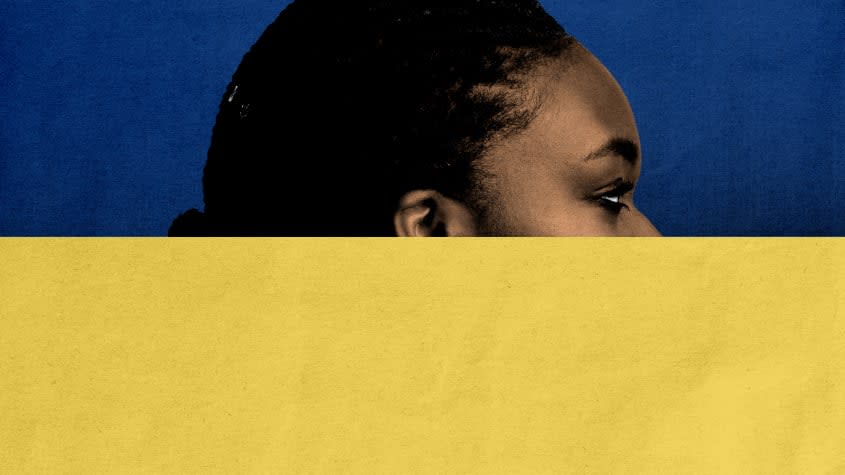The invasion of Ukraine and the moral conflict of sympathizing while Black

Like other devastating turning points in history, many of us likely remember how and where we heard last week's harrowing news: After weeks of rising tensions, Russia had invaded Ukraine.
As we read the updates from the comfort of our relatively peaceful countries, we've experienced these same feelings of sorrow, fear, and sometimes guilt before. But there's another feeling that members of marginalized ethnic and racial groups often experience when Western and other industrialized countries face turmoil: cognitive dissonance.
After all, how does one reconcile supporting a nation in anguish with the knowledge that the same nation exacts harm against you?
Even in times of crisis, sometimes the oppressed can also be the oppressor. In the immediate, chaotic aftermath of Russia's invasion, the United Nations admitted that non-Europeans living in Ukraine experienced "different treatment" by military officers, border guards, and groups of civilians while trying to flee the country, according to Filippo Grandi, the organization's High Commissioner for Refugees. While Ukraine was certainly not a racial utopia before Russia's invasion, it's disheartening to know that even in the midst of devastation, anti-Black racism can remain strong.
Bernice King, daughter of Martin Luther King Jr., shared similar sentiments in a now-deleted post describing what she called "sickening" treatment of Africans trying to flee Ukraine. One CNN producer even claimed his own sister, who is from Sierra Leon, was subject to racism while on a daring journey to escape Ukraine and enter Poland.
Unfortunately, this is not an anomaly. When the world cries for peace, it often overlooks the treatment of Black and brown people in the process. "On the world stage, everyone sings Kumbaya. But this is the reality of what it means to be Black globally," tweeted the official account for GrapevineTV, a Black millennial media brand, along with a video that appeared to show African people being blocked from entering a train in Ukraine.
While people scramble out of the country, the Ukrainian military divided people into groups of white and non-white, one Afro-Ukranian resident alleged. Grace Kass told Time that "she and other African women were forced to wait outside as snow was falling, while white women and children were allowed to board before them." And one student from Guinea described being stopped at the border in an interview with France 24, claiming border guards told him and his group "that Blacks were not allowed."
While some reports have attempted to suggest this treatment wasn't about race, Ukraine's former deputy chief prosecutor said the quiet part out loud. "European people with blue eyes and blonde hair being killed," he bemoaned in an interview with the BBC.
The people of Ukraine need help, resources, prayers, and support; like all humans in crisis, they unequivocally deserve it. And that's true even if some of their compatriots, soldiers, and officials deny the same care to Black people.
But that denial makes solidarity truly difficult for many Black people and people of color. As Dr. Ayoade Alakija, the World Health Organization special envoy for the ACT-Accelerator, explained on Twitter, "Black Africans are being treated with racism and contempt in Ukraine [and] Poland. [The] West cannot ask African nations to stand in solidarity with them if they cannot display basic respect for us even in a time of war."
This cognitive dissonance is not only felt with Ukraine. In China, as COVID-19 ravaged the land, and the world was left aghast by reports of chaos and death, some responded to the plight with xenophobia and horrid treatment of Africans in Guangzhou (many of whom were left homeless). Likewise, the world has rightfully supported France after terror attacks there in recent years. But the country's treatment of minorities (particularly Muslims) can pose a conflict for some people of color who want to offer sympathy but also know French secularism consistently results in anti-Islamic policies like barring Muslim women from wearing hijab.
And, of course, in the United States, Black people have long grappled with the dissonance between fighting for the military of a country that consistently hurts and persecutes them. As the late Muhammad Ali is often attributed as saying (in what may be a fake quote but nevertheless gets at a real sentiment), "No Viet Cong ever called me n----r."
From the perspective of basic humanity, it goes without question that everyone deserves compassion in times of calamity and bloodshed.
But for people of color, particularly Black people, experiencing crises like this is never that morally simple. There's a real ethical quandary here. Blanket demands to stand up for other people — as is so often and so carelessly expected of the Black community, which in America is broadly held to Martin Luther King Jr.'s standards of nonviolence and forgiveness — can feel deeply unfair, particularly for those personally affected by these acts of racism.
Maybe King was right, and we should embrace other peoples in times of crisis even if they have a history of cruelty toward us. But if you see Black people question or even falter in their support for Ukraine, ask yourself what you'd feel in our place.
You may also like
Putin threatens Ukraine with loss of statehood
How cheap Chinese tires might explain Russia's 'stalled' 40-mile-long military convoy in Ukraine
Aaron Rodgers reportedly has deals in place with the Broncos, Titans, and Steelers


